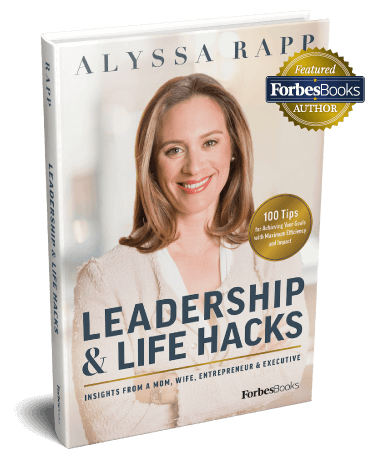4 Tips For Steering Your Business Through Tough Times

Good times come with this certainty: They never last.
For businesses, that means formidable challenges (a weak economy, new competition, a sea change in the marketplace) are always just around the corner, and unprepared business leaders face the potential for disaster.
“You don’t have the luxury of resting on your laurels,” says Alyssa Rapp (www.alyssarapp.com), CEO of Surgical Solutions and author of Leadership & Life Hacks: Insights from a Mom, Wife, Entrepreneur & Executive.
“You have to keep battling, innovating, out-innovating, and outworking your competition.”
She knows something about that. From 2005 to 2015, Rapp served as the founder and CEO of Bottlenotes Inc., charting a course for the company through the turbulent years of the Great Recession. During her time at Bottlenotes, Rapp was named one of Inc. Magazine’s “30 Under 30” coolest entrepreneurs in the U.S. Starting in 2015, she served as the managing partner at AJR Ventures, which advised privately-held companies and private equity firms on their digital-marketing strategies.
Rapp offers four tips for helping business leaders meet the toughest of times with a resolute attitude:
- Acknowledge fear, and move through it. Fear gets a bad rap, but it’s there for a reason: to protect you from something. “Just like standing on a balance beam is scary because your life or limbs are at risk, so, too, is making business decisions that carry huge risks,” says Rapp, a former competitive gymnast who knows something about balance beams. Your job is to acknowledge the fear – to take note of its presence – and then push through it. “Fear is a normal human response,” she says. “The trick is in not letting it dominate your psyche.”
- Commit to finishing what you start. You have to commit before you even begin. “If you start anything knowing you probably won’t succeed, then you won’t,” Rapp says. “You’re setting yourself up for failure. You must show up with full commitment, having faith, true grit, and belief in yourself.”
- Know that all great ideas start with ‘what if.’ Never be afraid to ask what if, over and over, until you find a solution, Rapp says. She points out that most of the best entrepreneurial innovation in the United States over the past 20 years has been born out of Silicon Valley, precisely because of the constant willingness to ask and re-ask this simple question. “Some people’s responses to challenges or obstacles are to stop asking questions,” Rapp says. “If you want to solve a problem, you have to open yourself up to the possibility that change is inevitable, and reframing the problem will present an otherwise undiscovered solution.”
- Remember that you have to be present to win.You can’t win a race if you’re not competing. “So before you do anything else – before you commit to finishing what you start, before you acknowledge your fear and move through it – you have to show up,” Rapp says. “Remember that saying that 80 percent of success is showing up? There’s truth to that because showing up matters.”
It’s inevitable that, regardless of how well you think you’ve planned, life will throw you curveballs, Rapp says.
“They will come at you in every area, every industry, every walk of life,” she says. “I’ve faced them as a mom, wife, entrepreneur, executive, friend – you name it. But I don’t run from them. I’ve learned to apply my brother’s advice: ‘The only way out is through.’ The truth is, I love curveballs, because each one comes with a question: What the hell are you going to do about it?”
About Alyssa Rapp
Alyssa Rapp (www.alyssarapp.com), author of Leadership & Life Hacks: Insights from a Mom, Wife, Entrepreneur & Executive, has been CEO of Surgical Solutions since 2018. Previously, from 2015 to 2017, she advised startups and private equity-backed companies through AJR Ventures. Prior to that, Rapp ran an e-commerce business called Bottlenotes. She has been named one of Crain’s Chicago’s “Notable Women in Health Care.” Rapp also teaches at Stanford Business School and has recently been named Adjunct Professor of Entrepreneurship at the University of Chicago’s Booth Business School.
